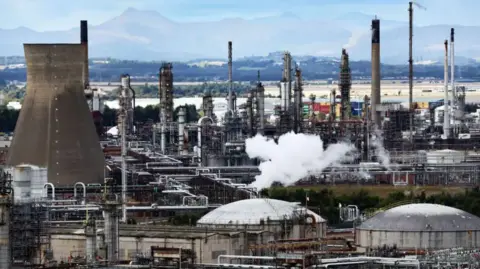Grangemouth refinery stops processing crude oil
 Getty Images
Getty ImagesScotland's only oil refinery has stopped processing crude oil at Grangemouth after a century of operations, its owner Petroineos has confirmed.
In September, the company announced refining activities would cease in 2025 as it transitions to becoming an import terminal for finished fuels.
The site on the south bank of the Firth of Forth is home to the UK's oldest oil refinery, dating back to 1924.
It is being closed down by Petroineos, with the loss of 430 of the 2,000 jobs based at the sprawling 1,700-acre industrial complex.
The union Unite said political leaders had "utterly failed" the workers and the Grangemouth community, and would face "electoral wrath".
The SNP has called for the refinery to be nationalised, a demand rejected by the UK government.
Petroineos has been operating as an import terminal for several months in parallel with refinery cessation activities.
Iain Hardie, regional head of legal and external affairs for the company, confirmed the end of oil refining.
He said: "Petroineos has invested £50m in creating a modern import and distribution terminal capable of receiving finished fuels by sea for onward distribution to customers around the country.
"From today, we will be importing all the products necessary to meet Scotland's demand for transport fuels."
About 70 refinery staff will remain to work on the new business.
Mr Hardie paid tribute to the workforce at the refinery, adding: "Our colleagues have shown incredible commitment, dignity and resilience during months of uncertainty regarding the future of this facility, through the consultation period, phased shutdown and the start of refinery decommissioning.
"It has been a challenging period but their professionalism has ensured security of fuel supply to our customers across Scotland and beyond."

Labour MP Brian Leishman, who represents Alloa and Grangemouth, told BBC Scotland he was "devastated" and "disgusted" by the promises broken by Scottish Labour leaders during the election campaign.
He said: " Broken promises have consequences.
"This is not just a dark day for Grangemouth, it's a dark for the Labour Party.
"We're the party of workers. We're born out of the trade union movement. By our inaction and by inertia over the past 10 months - it's not good enough."
Responding to the announcement in the House of Commons earlier, Mr Leishman accused governments of not doing enough to protect the refinery.
He said: "Scotland once again is a victim of industrial vandalism and devastation, and I don't want anyone in this chamber to dare mention a 'just transition', because we all know that the Conservatives when in power and the SNP currently in Holyrood did nothing to avert this catastrophic decision happening."
Mr Leishman also asked UK Energy Secretary Ed Miliband why the current Labour government had not stepped in to save jobs at the refinery.
Mr Miliband said the government had "put money in" to help workers and was "absolutely committed to building the future for Grangemouth communities".
He added that £200m had been set aside for the refinery.
'Industrial vandalism and devastation'
Unite Scottish secretary Derek Thomson said the first wave of redundancies marked the historic end of oil refining in Scotland.
"John Swinney and Anas Sarwar will face the wrath of voters for their broken promises to the workers and the people of Grangemouth," he said.
"Anas Sarwar pledged hundreds of millions to save the refinery and to fund a transition to renewable industries under a Labour government.
"Instead, not one job will be saved at the refinery, not one job will be created for years by Project Willow, and not one penny of the £200m National Wealth Fund can be unlocked without private investment."
The Scottish and UK governments funded the Project Willow report into the options for the site.
It said Grangemouth must switch to green energy to meet its vast need for power, and then use that to produce new sustainable products.
But it also said this would require around £3.5bn of private investment.
Petroineos has said the refinery is loss-making and has rejected claims from unions that the site could easily transition into a hub for producing sustainable aviation fuel.
First Minister John Swinney said the end of refining at the plant was a "very sad day for Grangemouth, and for the country more generally".
He added: "We have said all along that this decision was premature, fundamentally short-sighted and detrimental to the transition to net zero.
"Our calls for the UK government to step in and try and maintain operations have gone unheeded so far."

The refinery was opened by BP in 1924 and expanded into petrochemicals in the 1950s.
It served as the primary supplier of aviation fuel for Scotland's main airports while being a major supplier of petrol and diesel ground fuels across the Central Belt.
When the closure was announced, it accounted for about 14% of the UK's overall refining capacity and supplied almost two-thirds (65%) of demand for refined oil products in Scotland.
Ineos acquired the site in 2005 and is responsible for the entire plant - the largest industrial complex in Scotland - while the refinery itself is owned by Petroineos - a joint venture between Ineos and PetroChina.
Another 1,500 people are employed elsewhere at Grangemouth, with 500 working on the Forties pipeline, transporting 300,000 barrels of crude oil per day from 85 North Sea fields, and around 1,000 at a petrochemicals plant run by Ineos.
